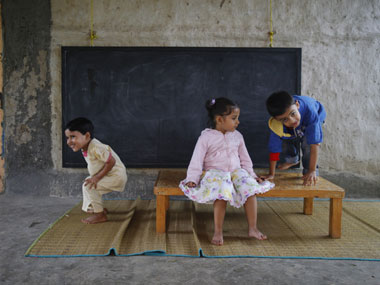In a development that should concern private schools that are running nursery classes as part of regular school, the Centre has told the Delhi High Court that it is against the ‘schoolification’ of children under six years. [caption id=“attachment_1135741” align=“alignleft” width=“380”]  Representational image. reuters[/caption] “Ideally, no formal school should have preschool as the needs of early years are much different that need a holistic and integrated life cycle approach. Putting 4-6 year olds in the schools would lead to ‘schoolification’/formalisation of education in the early years. This might inadvertently lead to their missing out on the much needed exposure to early childhood care and education in terms of inputs for good health, nutrition, psycho-social stimulation and play environment,” is what the Women and Child Development Ministry told the Delhi High Court in an affidavit filed by earlier this month in response to a public interest litigation. The Women and Child Development ministry has opposed the PIL that makes the case that in the interest of a uniform system of education, all government schools, like private recognised schools in Delhi, should introduce a two-year nursery or preschool. The ministry has told the High Court that the nursery should be established as an independent unit adhering to the norms of early childhood care and education (ECCE) norms. “If any entity that operates a formal education set-up is interested in establishing a non-formal pre-school/pre-primary section, then the same must be established as a separate unit, adhering to quality norms and standards of ECCE centres. This set up should function in the best interest of the child and should provide opportunity for holistic development of the young child.” The Women and Child Ministry has gone a step further and criticised the Delhi government for allowing private schools to run nursery as part of the formal school system. Responding to the petitioner’s contention that unaided recognised private schools in Delhi were adopting different age criteria for admission of children in nursery class, the Ministry states that “it is not in favour of admission of children in formal schools prior to Class 1, as early childhood is a very sensitive and impressionable stage and needs a different approach.” The PIL was filed by NGO Social Jurist last year. The petitioners, however, say that this is only a tactic by the government to avoid introducing a uniform system of education for government and private schools. The Ministry’s response to the needs of pre-school education – which has increasingly become a preserve of the privileged – is that that it is provided by Anganwadi Centres under the centrally funded Integrated Child Development Services (ICDS) scheme. In response to the Centre’s stance, High Court advocate Ashok Agarwal representing Social Jurist, a lawyer’s collective founded by him, said, “The government has raised a new controversy by saying that pre-primary schools that are being run by private schools is against interest of the child…The Ministry has even criticised the Delhi government policy of permitting children under six to be admitted in regular schools as being against the policy of the Union government.” Explaining the basis of the PIL, Agarwal said, “There should be a uniform system of education for private and government schools. When private schools run two-year pre-primary, then government schools should too. Some government schools run a one-year pre-primary, but not all. Why not give a poor man’s child the opportunity to go school at 3 years when a rich man’s child has that opportunity. But in order to avoid doing that, the government has responded by saying that pre-primary should not be part of the formal school system at all. And that children under six should go to Anganwadis.” But are anganwadis equipped with the resources or the specialised staff to provide preschool education? Says Agarwal, “What is level of infrastructure of our anganwadis? Do they have the resources to provide education? Some of the anganwadis are being run out of slums, who will ensure quality?” The affidavit, says Delhi High Court advocate Khagesh Jha, who is also associated with Social Jurist, assumes significance in the context of the Union Cabinet’s recent approval of the Women and Child Development Ministry’s proposals on National Early Childhood Care and Education (ECCE) policy. “The affidavit should be seen in the in light of the cabinet approval on September 20 of the national ECCE policy of Ministry of Women and Child Development. The affidavit repeatedly speaks about their ECCE policy and about the role of the anganwadis in implementing it,” said Jha. Quoting from the affidavit, “After 2009, Integrated Child Development Services (ICDS) has been universalised and preschool education is provided as one of the six services at the angwadi centres….In the light of the fact of the ICDS has been universalised, the provision of early childhood care and education is already available to all young children under six years through a network of 13.2 lakh anganwadi centres…the anganwadi centre is further being repositioned as a vibrant ECD (early childhood development) centre with more focus on ECCE under strengthened and restructured ICDS.” However, whether the ministry responsible for education Human Resource Development, agrees or contradicts the Women and Child development Ministry remains to be seen. The HRD ministry is yet to file its response to the petition in the High Court.
In a development that should concern private schools that are running nursery classes as part of regular school, the Centre has told the Delhi High Court that it is against the ‘schoolification’ of children under six years
Advertisement
End of Article


)

)
)
)
)
)
)
)
)



